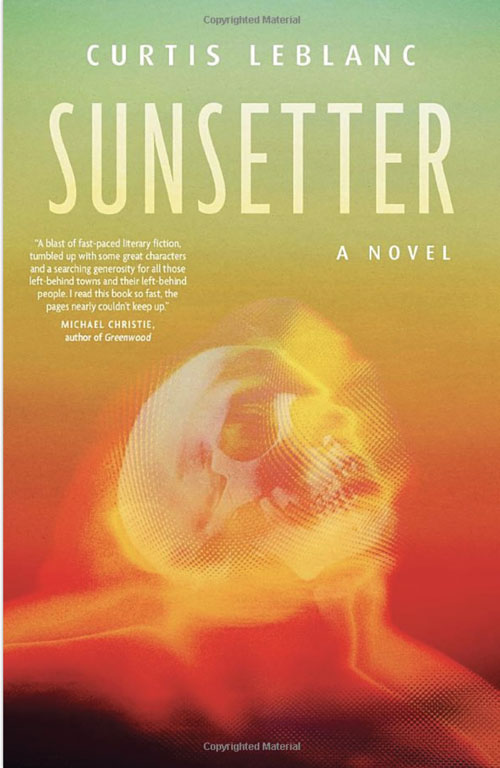The synopsis for Curtis LeBlanc’s new crime novel, Sunsetter, says the book is, among other things, a tale about “the fickleness of late-stage capitalism.” Sounds academic, but as with many classic crime tales that ruminate on themes of grift and corruption, this subtext is key to unravelling the book’s many mysteries.
The Sunsetter is a travelling rodeo and carnival, making its annual trip to teenage Dallan’s isolated prairie town. He and his friend Brooks are aimless and bored, looking for a drug hookup. Also in town is Hannah, a teenager struggling to survive on her wages at the local massage therapy clinic. She’s in love with Nick, a carny with the Sunsetter, and dreams of living with him. During a night at the rodeo, individual tragedies draw Dallan and Hannah together (to say more would spoil the plot), leading them on a path that reveals the corruption underlying the town’s drug trade. It’s an ideal thriller, filled with shady characters, corrupt cops, car crashes and sudden violence.
LeBlanc, author of two earlier poetry collections, clearly loves the genre, with his novel reminiscent of other stories from the hardboiled (Jim Thompson’s gritty morality tales) to the character-driven (Joe Lansdale’s southern-set yarns) to thrillers with a hint of horror (such as Ray Bradbury’s haunted environs). LeBlanc’s care as a poet creates rich and precise prose—the small-town prairie setting feels lived in, and the smell of beer, gunpowder and desperation lingers in the pages.
As with the best literary thrillers, Sunsetter doubles as social commentary, particularly on the opioid crisis and the complicity of policing with crime. Mirroring the twisty corruption revealed in the novel, the failure to properly address the opioid crisis speaks to our collective abdication of responsibility in the face of continued tragedy. To draw out the capitalist critique further, the criminalization of drugs needs the drug trade to exist; the book illustrates philosopher Paul Virilio’s dictum, “When you invent the ship, you also invent the shipwreck.” (Or, as the characters in Sunsetter find out, it isn’t paranoia if they’re really after you.) Much as the Sunsetter draws everyone into its orbit, so too, the book suggests, does capital. Some look to make a few bucks at the carnival, others to drown themselves in liquor and flashing lights. LeBlanc’s novel confronts the reader with the uncomfortable ways the drug trade exploits the mutual needs of both dealers and users—late-stage capitalism makes everyone complicit the victim needing the victimizer. Maybe the answer, as one character discovers, is to just run away and join the circus.
Bryn Evans is a writer and social worker in Calgary.
_______________________________________


